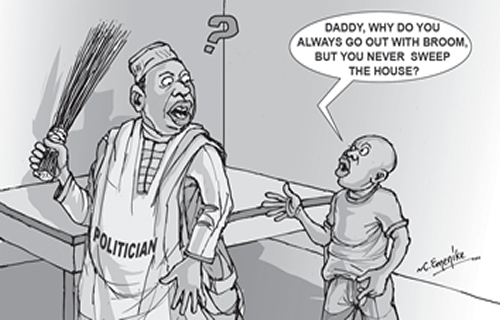
The alarming rate of insecurity in the country should rattle the Federal Government in its bid to create a conducive environment for rapid development. One area that deserves more serious attention is the prevalence of hard drugs in all nooks and crannies of our society.
To a few of our countrymen, it sounded wicked when Indonesia continued its maximum policy that has seen about seven Nigerians executed for drug related offences on Nusakambangan Island, Central Java.
There were pockets of demonstrations in the Federal Capital Territory condemning the executions. Indonesian President Joko Widodo has refused to be swayed by such demonstrations and appeals even from the West. Attorney General Muhammed Prasetyo defended the executions.
“I would like to say that an execution is not a pleasant thing. It is not a fun job. But we must do it in order to save the nation from the danger of drugs. We are not making enemies of countries from where those executed came. What we are fighting is drug related-crimes,” he said.
In April 2015, four Nigerians were among eight drug traffickers who faced execution in the same country. Jamiu Owolabi, Sylvester Obiekwe Nwolise, Okwudili Ayatanze and Martin Anderson rendered songs of praise as they were prepared for a firing squad.
Worldwide outrage especially by Australia which lost the duo of Myuran Sukumaran and Andrew Chan did not matter. What mattered was that those who led the infamous Bali Nine had to pay the supreme price. In July 2016, three more Nigerians, Seck Ousmane, Humphrey Jefferson and Michael Titus were shot in Indonesia.
Earlier, the Nigerian Senate had debated the worrisome trend of compatriots filling the jail houses of Far East countries following drug related offences. Gbenga Ashafa and Jibrin Barau were concerned that about 158 of our country men were awaiting death is such far flung places as China, Singapore, Malaysia, Thailand and Indonesia.
Although the National Drug Law Enforcement Agency [NDLEA] has been busy apprehending offenders around the country, the penalty for drug trafficking is like a slap on the wrist. We make bold to say that the Federal Government must review the penalty for drug trafficking.
If what it will take to fight drug traffickers is life jail, it will help the society. The fact that couriers walk in and out of Kirikiri and Ikoyi Prisons has not helped in the fight against drugs. While we do not support the death penalty, we are all out for tougher measures that will keep the polity safe. Bringing back the death penalty will take everyone back to the days of military dictatorship when the trio of Bartholomew Owoh, Bernard Ogedegbe and Akanni Ojulope faced a six-man firing squad at the Kirikiri Maximum Prison in 1985.
The issue at the time was not the offence but the wickedness in the punishment. A retroactive decree was promulgated by the junta to kill young men who in their confession admitted possessing drugs but would not have been into it if they knew they were going to die for such offence.
The executions were halted over 30 years ago. Today, drugs have come to assume a dangerous place in our national life. With the economy going down faster than the speed of sound and the corollary high rate of unemployment, more Nigerians are taking to drugs as the crime rate soars. And it has gone beyond cocaine, heroin and opiates. In every corner of the inner city, drug joints abound like market stalls. Motor parks are full of drinking spots.
Even beer parlours appear so only to the uninitiated. Behind the façade, drugs can come across the counter. It does not have to be the brownish white substance. Some come in form of drinks and bear very funny names.
We need to be asking ourselves why there are deadly cult groups fighting for supremacy even in primary schools. Boys now kill without looking back. A pass at someone’s girlfriend is just enough to ignite a cult war.
And the truth is that most of these fights are induced by drugs which are available so easily. The drug fights assume a higher dimension when emboldened by their Dutch courage, the youth turn to terrorism under the guise of militancy. It was not so easy to behead fellow humans in our country in the last decade.
Today, if it is not Boko Haram, it is a nephew beheading his uncle or a man axing his spouse. Government must take a tougher stance on drugs. In a letter to President Olusegun Obasanjo in 2007, shortly before the execution of two Nigerians, Amara Tochukwu Iwuchukwu and Nelson Okeke at Changi Prison, the Singaporean Prime Minister wrote, “Mr. Tochi’s family will find Singapore’s position difficult toaccept, but we have a duty to safeguard the interest of Singaporeans, and protect the many lives that will otherwise be ruined by the drug syndicate.”
While we expect a review, government must also begin to revamp the economy by providing jobs to young Nigerians who are forced into drugs mainly because they have been rendered idle by bad leadership.
Source: New Telegraph